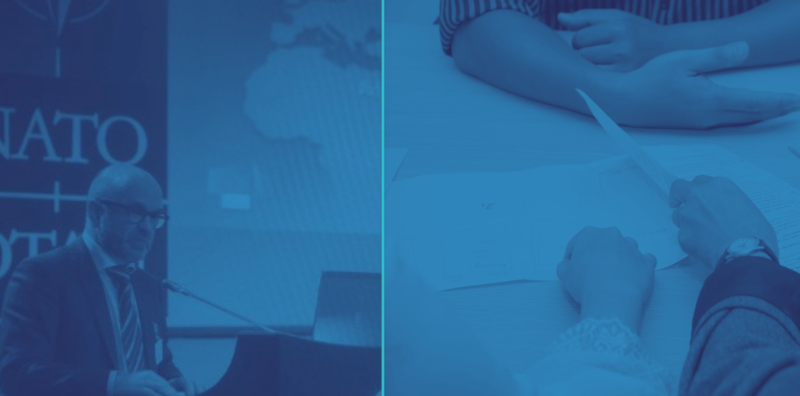
In the midst of a worldwide pandemic, metamorphosing markets, and controversial world leaders, the European Union has undisputedly, in more ways than one, lost the socio-political influence it once exercised. The rise of the Chinese economy, the USA’s increasing protectionism, and Russian resistance has pushed the European Union to strengthen its home relations and strategies. At the same time, increasing Euro-scepticism threatens a renewal of Brexit, or, more dramatically, a significant deterioration of the democratic credentials that Europe was once praised for. These factors make it difficult for the Union to achieve Charles Michel’s aim of “less dependence, more influence”, yet this independence has never been more pressing.
Bruno Dupré, a European diplomat, has been the security and defence advisor to the Secretary General of the European External Action Service since 2017. In the following interview, he sits down with EST UK Ambassador Diane Dupré to evaluate the European need for ‘strategic autonomy’ and its renewed significance, as well as the obstacles the Union might face on its quest to more autonomy in strategic sectors.
D: What is meant by the term ‘strategic autonomy’? Would you adopt the more narrow conception of autonomy, focusing on the EU lessening its dependence on the US and China, or do you accept a more ambitious understanding of strategic autonomy, where the EU seeks to set standards across the globe according to its values and interests?
B: “Strategic autonomy means “acting collectively when we can but autonomously when we must”. To achieve this goal we must, first, be honest with ourselves and assess our strategic vulnerabilities. We know for instance how dependent we are on the US for our security, on China for key technologies, on Russia for our energy. We need to further analyse the future trends and define our priorities. If we do not reduce these dependencies in the years to come, we will be constrained in our freedom to act and to anticipate. Assessing these vulnerabilities may result in strategic decisions towards diversifying our sources of supply for critical products (masks, paracetamol, lithium…). It may even result in reshoring or stockpiling back in Europe, in exceptional circumstances. This does not mean looking for autarky, protectionism, or independence. It means we will refuse interdependence imposed on us and will push back each time necessary. This is true for our security (AUKUS deal and Australian negotiations put on hold by the EU), as well as for our financial and economic sector for which we will continue to promote our values for fairness, good governance, reciprocity, and equal opportunities. This is the conditions for democracy survival, nothing less.”
D: In what ways is the EU still a world leader today? How has its influence evolved in the past two decades – what has it lost and what has it gained?
B: “For decades EU influence in the world has consisted in promoting high standards within an open market (the European Single Market) based on free trade, rule of law, good governance, and transparency. The EU defended these values through bilateral and multilateral trade and financial negotiations with all stakeholders. Today this soft power approach is not enough to survive in a zero-sum gain world that has become very confrontational. Four years of the Trump administration and two years of Covid have amplified
an increasing transactional approach to international relations. The EU has to learn the language of power to counter new types of war (cyber security, asymmetric warfare, the weaponization of immigration) and maintain its way of living. Strategic autonomy is the political vision that will help the EU to push back by supporting new European capacities in the military field (first entry forces) but also in the economic sector (reinforcing value chains in micro-electronics, batteries, hydrogen, internet of things…) to remain competitive. The increasing tension among big powers will oblige the EU to position itself as a global and geopolitical actor. The EU has lost some sort of strategic innocence to gain some sort of strategic maturity to face centrifuges forces at play inside and outside its frontiers.”
D: What do you think of the ‘Brussels effect’? Is it an ability which the EU should use to pursue its goals, or is European standard-setting blocking development in other continents, in a new form of ‘modern-day colonialism’?
B: “There is indeed a Brussels effect as described by Anu Bradfor. Just by the example, the EU high standard setting has had virtuous effects on normative standards across the world without the need to resort to international institutions or bilateral negotiations (see REACH regulation, RGPG, gas emission, environmental norms). This is the result of 60 years of soft power that have strengthened our strategic autonomy. We should not be ashamed of this success. This has not been achieved coercively and multinational companies saw the benefit for themselves. However, this soft way of influencing worldwide business is very much behind us. First, new big powers such as China have emerged and do not respect a level playing field (on IPR, market access, state subsidies…). Second, we are on the verge of losing the battle of digital if we do not act rapidly as China and the US are technologically ahead of us. This technological battle will define the standards of tomorrow for the economic, financial, and security market. Digital will be the mother norm of all norms. Only by joining the forces of the public and private sectors will we be able to stay in the race for a better protection of our citizens in the face of increasing breach of privacy.”
D: In the words of Le Drian and Parly, the botched submarine deal between Australia and France was an economic betrayal that has “heighten[ed] the need to raise the issue of European strategic autonomy”. Do you think this event has given the EU sufficient momentum to redefine its relationships abroad? Or, does this event illustrate – as the Financial Times’ writer Ben Hall has purported – the EU’s ability to “close [its] eyes and be in a state of denial”?
B: “It is not so much the submarine deal, which is a private contract, then the AUKUS agreement, a tripartite security arrangement for the Indo-Pacific, which is at issue here. It is not so much an economic betrayal but a diplomatic and military “coup dans le dos” by three countries: The US, UK, and Australia. For decades, we have been supporting each other not only to fight two wars but more recently to protect our respective ports, navies, and citizens while fighting terrorism and defending common values. Finally, it is not a question of money but of trust among allies. Confidence-building measures will be needed to restore the status quo ante among the four countries. What is remarkable in this crisis is how a Franco-American affair has become an EU/US issue, leading President Biden to offer compensation on key issues not only to France but also to the EU itself (on European defence policy and on the EU Indo-Pacific Strategy). If some EU Member States may have been in a state of denial, they have also understood the power of pushing back together to be more respected.”
D: What are the major challenges facing the EU on its quest to strategic autonomy?
B: “There are internal and external challenges.
– Many EU MS are sceptical about the concept itself either because they favour NATO over the EU (they are afraid that strategic autonomy will mean that the EU wants to ensure its own security) or they are strong supporters of an ultra-liberal economic system. Strategic autonomy is very much a French idea supported by the European Parliament, the Council and to a lesser extent by the Commission. Even Germany is not at ease with the concept but remains so far “solidaire” of the French authorities;
– The US itself is very sceptical as Washington sees the concept as a way to undermine the transatlantic link and NATO;
– Beyond the concept itself, the main challenge is the EU’s real political commitment to develop military, economic and financial capacities to decrease its dependence vis-à-vis the US, China, and Russia and to prepare for the major technological stakes of the 21st century: the digital and climate transition. This will require a lot of investment and a new approach to partnership not only between the public and private sector but with like-minded states that share our values (Australia, India, Japan, Taiwan, South Korea).”
D: Can the EU have a future without autonomy? What would this look like?
B: “A future without autonomy is possible but it means that we will be dependent on the goodwill of China, Russia and the United States. As a new type of Cold War is possible between China and the United States, we would take the risks of being dependent for our security and for our economy on two rivals without any possibility to decide for ourselves. Is this the future we want for ourselves and for our children?”
References
European Council (2020, September 28). Strategic Autonomy for Europe – the aim of our generation’ – speech by President Charles Michel to the Bruegel Think Tank.
Retrieved from:
https://www.consilium.europa.eu/en/press/press-releases/2020/09/28/l-autonomie-strategique-europeenne est-l-objectif-de-notre-generation-discours-du-president-charles-michel-au-groupe-de-reflexion-bruegel/
Helwig, N. (2019, October). EU Strategic Autonomy: A Reality Check for Europe’s Global Agenda. FIIA Working Paper 119
Retrieved from: https://www.fiia.fi/wp-content/uploads/2020/10/wp119_strategic_autonomy-2.pdf
Hall, B. (2021, September 21). France hopes to salvage EU autonomy from submarine deal wreckage Financial Times. Retrieved from: https://www.ft.com/content/049638c2-ccf9-4fea-a860-203a7e26c566
photo credit:
https://www.linkedin.com/in/bruno-dupré-ph-d-6358206/?originalSubdomain=be

 Is Nuclear Disarmament Still a Dream? The Third Meeting of State Parties in Perspective
Is Nuclear Disarmament Still a Dream? The Third Meeting of State Parties in Perspective  Strategic Saboteur: Hungary’s Entrenched Illiberalism and the Fracturing of EU Cohesion
Strategic Saboteur: Hungary’s Entrenched Illiberalism and the Fracturing of EU Cohesion  The invention of development: power, narrative, and the afterlife of Truman’s speech
The invention of development: power, narrative, and the afterlife of Truman’s speech  Is the World Trade Organisation a Failure?
Is the World Trade Organisation a Failure? 


